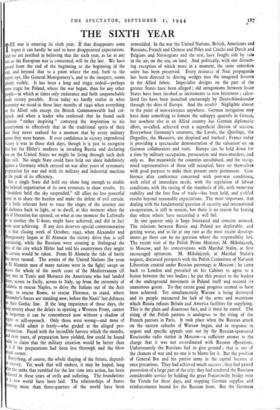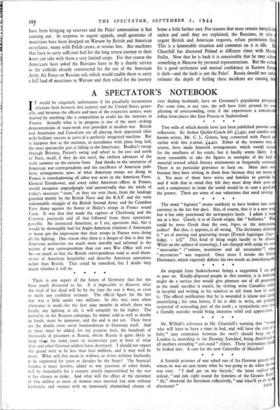THE SIXTH YEAR
HE war is entering its sixth year. If that disappoints some hopes it can hardly be said to have disappointed expectations. And we are justified in believing that the sixth year, as far at any rate as the European war is concerned, will be the last. We have passed from the end of the beginning to the beginning of the end, and beyond that to a point where the end, both to the expert eye, like General Montgomery's, and to the inexpert, seems plainly visible. It has been a long and tragic ordeal—perhaps more tragic for Poland, where the war began, than for any other people—in which at times only endurance and faith unquenchable made victory possible. Even today we hardly realise in what extremity we stood in those later months of 1940 when everything on the Allied side except the British Commonwealth had col- lapsed, and when a leader who confessed that he found such solation " rather inspiring " conveyed the inspiration to his untrymen so effectively that in the traditional spirit., of their ce they never realised for a moment that by every military non they were beaten. If ever confidence in victory engendered qctory it was in those dark days, though it is just to recognise that but for Hitler's madness in invading Russia and declaring 'ar on the United States we might be living through such dark ays still. No single State could have held out alone indefinitely gainst a Germany which entered on war after years of systematic reparation for war and with its military and industrial machine the peak of its efficiency.
But a single State did hold out alone long enough to enable e belated organisation of its own resources to show results. Its ' shoulders held the sky suspended," till allies no less powerful me in to share the burden and make the defeat of evil certain. t is little relivant here to trace the stages of the journey out f darkness back to light, or to dwell, at this moment when the ra of liberation has opened, on what at one moment the Luftwaffe r at another the U-boats might have achieved, and did in fact one near achieving. If any date deserves special commemoration is that closing week of October, 1942, when Alexander and ontgomery began at El Alamein the victory drive that is still ntinuing, while file Russians were creating at Stalingrad the pic of the city which Hitler had told his countrymen they might certain would be taken. From El Alamein the tide of battle s never turned. The armies of the United Nations (for even t El Alamein men of many nations were in the fight) swept on cross the whole of the south coast, of the Mediterranean till y met in Tunis and Morocco the Americans who had landed re, across to Sicily, across to Italy, up from the extremity of labria to rescue Naples, to drive the Italians out of the Axis nip, to rescue Rome, to rescue Florence, to stand, where ezander's forces are standing now, before the Nazis' last defences their Gothic line. If the long impatience of those days, the rig anxiety about the delays in opening a Western Front, cannot forgotten it can be remembered now without a shadow of ret or self-reproach. Only those were wrong—and most of rn would admit it freely—who girded at the alleged pro- stination. Faced with the incredible harvest which the months, even years, of preparation have yielded, few could be found lay to claim that the military situation would be better than 3 if the preparations had been less thorough and the blow k sooner.
Everything, of course, the whole shaping of the future, depends victory. Yet work that will endure, it may be hoped, long er the tanks that 'rumbled for the last time into action, has been ved in these years of strife and suffering. The .foundations a new world have been laid. The relationships of States ering more than three-quarters of the world have been remoulded. In the war the United Nations, British, Americans and -Russians, French and Chinese and Poles and Czechs and Dutch and Belgians and Norwegians and the rest, have fought side by sida in the air, on the sea, on land. And politically, with one disturb- ing exception of which more in a moment, the same unbroken unity has been preserved. Every resource of Nazi propaganda has been directed to driving wedges into the imagined fissures in the Allied fabric. Imperialist designs on the part of the greater States have been alleged ; old antagonisms between lesser States have been invoked as incitements to new bitterness ; calcu- lated lies have been launched unceasingly by Deutschlandsender through the skies of Europe. And the result? Negligible almost to the point of non-existence anywhere. German instigation may have done something to foment the unhappy quarrels in Greece, but nowhere else in an Allied country has German diplomatic effort, so-called, achieved even a superficial illusion of success. Everywhere Germany's creatures, the Lavals, the Quislings, the Degrelles, the Musserts, are despised and loathed ; France today is providing a spectacular demonstration of the valuation" set on German collaborators and tools. Europe can be held down for a time by military occupation, persecution and mass-murders, and only so. But meanwhile the countries unsubdued, and the recog- nised representatives of those still occupied, have set themselves with good purpose to make their present unity permanent. Con- ference after conference concerned with post-war conditions, with relief of immediate needs, with the regulation of labour conditions, with the raising of the standards of life, with monetary stability and the free flow of trade—has been held, and y:e10ed results beyond reasonable expectations. The most important, that dealing with the fundamental question of security and international co-operation, is still in session, but there is no reason for fearing that where others have succeeded it will fail.
In one quarter only is 'hope frustrated and concern aroused. The relations between Russia and Poland are deplorable, and getting worse, and so far at any rate as the most recent develop- ments go there can be no question where the responsiblity lies. The recent visit of the Polish Prime Minister, M. Mikolajczyk, to Moscow, and his conversations with Marshal Stalin, at first encouraged optimism. M. Mikolajczyk, at Marshal Stalin's request, discussed prospects with the Polish Committee of National Liberation created under Russian patronage at Moscow ; he came back to London and prevailed on his Cabinet to agree to a fusion between the two bodies ; he put this project to the leaders of the underground movement in Poland itself and secured its tinanimOus assent. To that extent good progress seemed to have been achieved. Yet simultaneously Warsaw is being destroyed and its people massacred for lack of the arms and munitions which Russia refuses Britain and America facilities for supplying. This is the plain and disastrous fact, and it must be stated. The rising of the Polish patriots is analogous to the rising of the French patriots in Paris. It took place when the Russian attack on the eastern suburbs of Warsaw began, and in response to urgent and specific appeals sent out by the Russian-sponsored Kosciuszko radio station in Moscow—a sufficient answer to the charge that it was not co-ordinated with Russian *rations. Unfortunately the Russians had to give ground ; that is one of the chances of war and no one is to blame for it. But the position of General Bor and his patriot army in the capital became at once precarious. They had achieved much success ; they had gained possession of a large part of the city; they had rendered the Russians considerable service by holding the great Poniatowsky bridge over the Vistula for three days, and stopping German supplies and reinforcements bound for the Russian front. But the Germans have been bringing up reserves and the Poles' ammunition is fast sunning out. In response to urgent appeals, small quantities of munitions have been dropped on Warsaw by British and American aeroplanes, many with Polish crews, at serious loss. But machines that have to carry sufficient fuel for the long return journey to their 'cases can take with them a very limited cargo. For that reason the Americans have asked the Russians leave to fly a shuttle service to the airfields already constructed for the use of the American Army Air Force on Russian soil, which would enable them to carry a full load of munitions to Warsaw and then refuel for the journey home a little farther east. For reasons that must remain inexplicab unless and until they are explained, the Russians, in spite urgent British and American requests, refuse permission flat This is a lamentable situation and comment on it is idle. Churchill has discussed Poland at different times with Mars Stalin. Now that he is back it is conceivable that he may achi something at Moscow by personal representations. But the outl for a good settlement and mutual confidence in Eastern Euro is dark—and the fault is not the Poles'. Russia should not under estimate the depth of feeling these incidents are causing lief



























 Previous page
Previous page